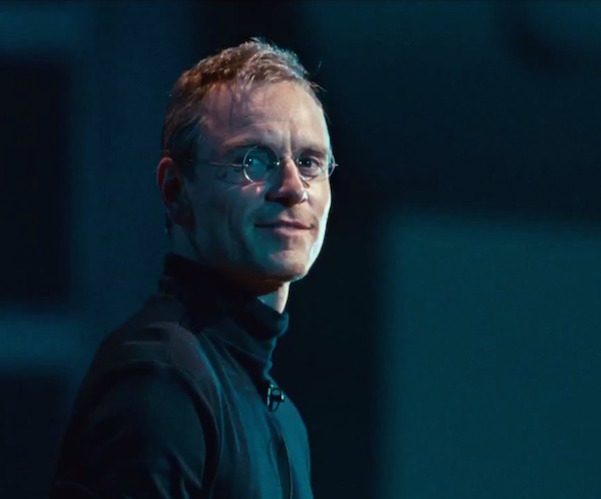Film Review: “Steve Jobs”—Computer Crash
Steve Jobs is a one-dimensional film about a terminally self-absorbed character.
Steve Jobs directed by Danny Boyle. At theaters throughout New England.

Michael Fassbender as Steve Jobs in the film “Steve Jobs.”
By Paul Dervis
“Amazing grace! How sweet he sound
That saved a wretch like me!
I once was lost, but now I’m found
Was blind, but now I see.”
The opening stanza of that old gospel tune could be the wrap-up statement for the new film about the Apple computer icon Steve Jobs. Unfortunately, the rebirth comes off as too little, too late, both for the title character as well as for the movie itself.
Though the picture looks at Jobs from 1984 to 1998, it only focuses on three pivotal days…each revolving around the launch of a new product. Even more micro, the screenplay hones in on the hour proceeding the corporate ballyhoo. The approach is an attempt to examine Jobs at the nexus of his career, at those times when he was at his nastiest yet most vulnerable.
Screenwriter Aaron Sorkin, who seems to be able to tap into Hollywood gold, is off the mark here. He can’t keep up an intense drama while providing potted revelations about Jobs during his most pressure-packed moments. The creator of such heavyweight projects as The West Wing, A Few Good Men, Moneyball, and The Social Network goes back to a familiar well, but ends up stuck in an endless circular loop. His narrative is rooted in repetition: big auditoriums, the public clambering to see his new computers unveiled, his colleagues bitching about his inability to share credit, and Jobs’s personal life in shambles while he remains, as usual, in deep denial.
In 1984 we see a Jobs who refuses to accept paternity for a five-year-old he clearly sired. Worse, he cruelly rejects his responsibility in front of the little girl. The mother is forced to go on welfare though Jobs’s net worth is in the hundreds of millions. Even his most ardent supporter, partner Joanna Hoffman (played with uncharacteristic subtlety by Kate Winslet), is taken aback by his coldness. But Jobs is the gravy train she has decided to ride. Seth Rogen’s Steve Wozniak pleads for a morsel of credit, but Jobs is unable to thank anyone but…himself.
The following uber scene is the 1988 unveiling of Jobs’s NEXT black box. By now he has lost a savage power struggle at Apple and is going off on his own. But he doesn’t have the computer savvy to succeed without his core group of geniuses: Jobs goes into the launch aware of its certain doom. His former friends are there to watch the crash. Jobs’s daughter is there as well, seemingly coming to terms with the alienating father she has been dealt.
But nothing has changed in Jobs’s inhumane attitudes. No personal growth; no lessons learned. They say we learn more from our failures than our victories, and maybe in real life Jobs did make some self-discoveries…but there is no evidence of that in this film. It is hard to believe that one could get paid enough to make it worth working for him…yet Winslet’s Hoffman stands by her man.
Finally, it is 1998 and Jobs is back running the Apple corporation that the present day public knows so well. They are about to launch iMac and nothing about the digital revolution will ever be the same.
But he still can’t give credit where credit is due. And to make matters worse, his daughter, a student at Harvard University, needs her tuition paid and he is balking. He is punishing her for something her mother has done. Then he finds out one of his partners paid the bill for her.
Finally. The man Steve Jobs has become is revealed.
But is it too late? For me it is.
Michael Fassbender, who is ensconced in the X-Men franchise, does a lot with very little. He is handcuffed to a one-dimensional, terminally self-absorbed character, yet he holds your attention with a powerhouse performance that muscles its way through the script’s sludge with a strength of will that at times is quite riveting. If he had been given equally strong support by Sorkin and director Danny Boyle (Trainspotting, Slumdog Millionaire), this would have been a better film.
Alas, the actor was not. Steve Jobs is stillborn…but maybe that’s the point.
Paul Dervis has been teaching drama in Canada at Algonquin College as well as the theatre conservatory Ottawa School of Speech & Drama for the past 15 years. Previously he ran theatre companies in Boston, New York, and Montreal. He has directed over 150 stage productions, receiving two dozen awards for his work. Paul has also directed six films, the most recent being 2011’s The Righteous Tithe.
Tagged: Aaron Sorkin, Apple, Danny Boyle, Michael Fassbender, Paul Dervis
